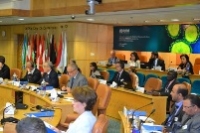 At present the source of infection as well as how the virus transmits among humans remain unknown. There is currently also limited evidence that the virus can transmit from person to person.Over 100 health officials from the countries in the Eastern Mediterranean Region as well as from France, Germany and the United Kingdom met in the WHO Regional Office in Cairo from 20 to 22 June and discuss a collective response plan to counter the threats of novel coronavirus infection to global health.
At present the source of infection as well as how the virus transmits among humans remain unknown. There is currently also limited evidence that the virus can transmit from person to person.Over 100 health officials from the countries in the Eastern Mediterranean Region as well as from France, Germany and the United Kingdom met in the WHO Regional Office in Cairo from 20 to 22 June and discuss a collective response plan to counter the threats of novel coronavirus infection to global health.
Dr Ala Alwan, WHO Regional Director for WHO Eastern Mediterranean, and Dr Keiji Fukuda, Assistant Director-General for Health Security and Environment, inaugurated this meeting which was also attended by WHO staff from the Regional Offices for the Eastern Mediterranean and for Europe and WHO headquarters, as well as representatives of WHO collaborating centres and other key technical partners and networks that have been involved in the global response to Middle East respiratory syndrome coronavirus (MERS-CoV). The meeting discussed the public health threats related to the emergence of this virus, reviewed the current level of preparedness and response measures in the region as well as provided recommendations that can collectively improve and strengthen global public health preparedness against MERS-CoV.
The meeting recognized that three main epidemiological patterns of this novel virus have been observed so far.
- Sporadic cases in communities: At present, the source of the virus infection or how these people became infected remain unknown;
- Clusters of infections in families: In most of these clusters, there appears to be person-to-person transmission, but it seems that this transmission was limited to people who were in close contact with a sick family member;
- Clusters of infections in health care facilities: In these clusters, the sequence seems to be that an infected person was admitted to hospital where that person then transmitted the virus to other people in the health care facility.
The meeting acknowledged that despite no current evidence of sustained human-to-human transmission, MERS-CoV may evolve to spread quickly among humans and affect wider geographical areas. While major knowledge gaps remain in understanding the emergence of this virus, clinical manifestations as well as the transmission risk, recent scientific research is enhancing the global knowledge on the disease. This new knowledge now needs to be translated into a set of concrete public health actions in order to improve global and regional public health preparedness.
The meeting also recognized that as much collecting and sharing of full epidemiological, clinical, immunologic and virologic information related to MERS-CoV infections are essential for better understanding and characterization of the disease that will contribute to global preparedness against this novel infection, coordinated and inter-sectoral actions are also important to increase global, regional and inter-regional collaboration among countries, with WHO and other international health partners in responding to the outbreak caused by this novel virus.
The countries were also encouraged to improve surveillance for detection of any sign that signals sustained human-to-human transmission as well as participate in further development of diagnostic assays through international networking with technical agencies, sharing of materials and resources, and participation in laboratory studies.
The meeting identified a set of concrete public health action points that can collectively improve and strengthen global public health preparedness, surveillance and response to MERS-CoV.
Related links
Press release: Public health officials agree on priority action to detect and control MERS-CoV
WHO consultation to discuss novel coronavirus infection in humans, 14–15 January 2013
EMHJ supplement on novel coronavirus


